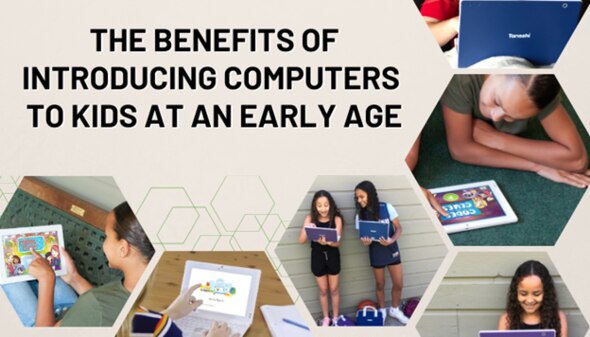The Benefits of Introducing Computers to Kids at an Early Age
The ability to understand and use technology is no longer an optional skill. It is already a fundamental necessity. For the younger generation, computers and digital technology are their natural environment. Over 92% of jobs need digital skills and computer literacy. It has become as vital as reading, writing, and arithmetic.
Computer literacy extends far beyond being able to surf the internet or play video games. It includes understanding the operation of a computer and even early programming skills.
This breadth of knowledge opens possibilities for creativity, collaboration, and exploration. It’s like equipping children with a passport to the world. This is where educational computers for kids serve as a versatile tool. It helps shape their learning experiences.
Let’s explore the benefits of introducing computers to children early. Through early computer education at home, as well as computer classes in school, children can thrive where digital fluency is a passport to success.
Historical Context and Evolution of Computer Literacy
Computers were once hefty machines that filled entire rooms. They were tools exclusive to corporations and academia in the late 20th century. These devices were only for data processing tasks and complex scientific calculations. Now, this is far from the grasp of a common individual, let alone children.
But, with time, there was a shift in the perception of computer skills. Computers started to permeate homes, bringing an understanding of their operation.
Early computer games for PCs began capturing young minds. It instigates a curiosity and eagerness to explore these machines.
Current Status of Computer Literacy
Fast forward to today, computers have woven themselves into our daily life. We can use computers to book a cab, plan a holiday, or attend virtual meetings. Computers simplify tasks and enhance productivity.
In education, a children’s computer or a learning tablet has become standard equipment. Schools across the globe incorporate digital education into their curriculum. They introduce laptops for kindergarten students and develop games for PCs. This makes learning fun and interactive.
Computer literacy is no longer desirable in the modern workforce—it’s a prerequisite. Computer skills are necessary for various careers like medicine or education.
That is why investing in the best tablet or laptop for kindergarten is wise for a child’s future. It sets a strong foundation for the digital skills they will need.
The Impact of Computers on Early Learning
There is a profound influence of computers on early learning. Here’s how educational computers for kids impact early learning.
1. Cognitive Development
At the heart of cognitive development lies the enhancement of problem-solving skills. Interactive games for PCs, tailored for children, involve puzzles or challenges. It requires a child to think and devise strategies to progress. This stimulation encourages kids to think critically. It then promotes their problem-solving capabilities.
Computers also foster critical thinking and creativity. Digital drawing tools or music composition software allow children to express their ideas. Case studies show that creative software can boost a child’s creativity. This turns a laptop for kindergarten students into a canvas for their imagination.
2. Social Development
Computers also play a critical role in communication and collaboration. Collaborative platforms allow children to work on group projects. It teaches them to:
- Share ideas
- Distribute tasks
- Respect others’ contributions
This interaction cultivates teamwork skills and fosters a sense of empathy.

Computers also enhance cultural understanding and global awareness. The internet exposes children to
- Cultures
- Traditions
- Global issues
This promotes inclusivity and diversity. In this way, kids’ laptop becomes a window to the world. It broadens their horizons beyond their immediate surroundings.
3. Skill Acquisition
Early exposure to coding and computational thinking is noteworthy when discussing skill acquisition. Coding platforms for children provide an entry point to the world of programming. This paves the way for future tech innovators.
Apart from coding, computers also help develop research skills and digital literacy. Children learn to:
- Seek information
- Check sources
- Use digital tools
Educational websites foster curiosity. It also provides a safe environment for exploration and learning.
Benefits of Early Introduction to Computers
Integrating computers into children’s lives at an early age offers advantages. An educational computer for kids impacts early learning. It provides academic advantages that pave the way for future career prospects. It also contributes to personal development.
1. Academic Advantages
Many educational resources, including textbooks and assessments, have migrated to digital platforms. A kids’ laptop with the right educational software can make learning more interactive.
Computers can also enhance learning across various subjects. For example, in math, games for PC can turn abstract concepts into visual experiences.
In science, simulation software can bring complex theories to life. Computers also offer tools for improving grammar, vocabulary, and pronunciation in language learning. Thus, kids’ laptop is a multifaceted educational resource, augmenting traditional teaching methods.
2. Future Career Prospects
The demand for computer skills stretches across a multitude of industries. Early exposure to computers gives children a head start. It equips them with sought-after skills in the workforce.
Familiarity with computers can also ignite a passion for tech-related careers. It may nurture the next generation of programmers or tech entrepreneurs. This is because kids’ laptops expose kids to coding games or even hardware components. The best laptop for kindergarten could be the first step toward a tech career.
3. Personal Development
On a personal level, using computers can foster self-confidence and autonomy in children. As they navigate the software or troubleshoot minor issues, they experience accomplishment. This success bolsters their self-esteem. It also encourages them to take the initiative and explore further.
Computers encourage lifelong learning and adaptability to technological changes. With the rapid pace of technological advancement, adapting is invaluable.
Thus, a learning tablet for kindergarten is not only a tool for immediate learning. It is also a means to instill a learning mindset that will serve children throughout their lives.
4. Enhances Creativity and Innovation
Early exposure to computers can boost children’s creativity and innovation. Various computer programs allow children to explore different art, music, and design forms. Programs like digital painting tools enable kids to express themselves. This can also help foster a love for the arts.
Additionally, computer games and applications often encourage problem-solving and strategic thinking. These experiences can help kids think outside the box and develop innovative solutions. Coding and programming activities can instigate innovative ideas. It makes children creators of technology, not only consumers.
5. Develops Social Skills and Collaboration
Contrary to popular belief, computers can promote social interaction and collaboration among children. Many educational games and activities need team effort and collaboration. These activities can help children learn about teamwork, sharing, and cooperation.
Educational platforms also offer moderated environments for children to interact with peers. These interactions can help children understand different cultures. It can enhance communication skills and form friendships.
Potential Challenges and Solutions
While there are benefits of early computer introduction, there are also challenges. Since it’s still a child, addressing health and online safety is vital. This is to balance everything and have a positive experience.
1. Health Concerns
One common concern with early computer use revolves around health. This is particularly in screen time and physical activity. Prolonged screen exposure can cause:
- Eye strain
- Headaches
- Sleep issues
Sedentary behaviors associated with computer usage can also contribute to physical health problems. For youth experiencing anxiety or stress from constant exposure to technology, online therapy for youth can provide the necessary mental health support.
Balancing screen time with physical activity is important to mitigate these issues. The American Academy of Pediatrics recommends clear limits on screen time. It suggests no more than one hour per day on computers for children aged 2 to 5.
There should also be a personalized plan for kids aged 6 and above. Regular breaks and appropriate screen distance can help maintain physical and eye health.
2. Online Safety
While a vast knowledge resource, the internet poses potential risks for young users. Examples are:
- Cyberbullying
- Exposure to inappropriate content
- Online privacy breaches
These are only a few concerns that parents and educators must address.
Parents and educators can use parental controls on Apple and Android devices, such as Google Play, to ensure online safety and privacy. They must also set strong passwords. Educating the children about not sharing personal information online is also important.
You must also cultivate an open dialogue about online experiences. This will help the children to feel comfortable discussing any concerns they encounter.
3. Educational Equity
The digital divide can block the benefits of an educational computer for kids. Students from low-income families might have different access to computers or high-speed internet. This creates inequality in educational opportunities.
To promote digital equity, non-profit organizations or government policies play a crucial role. Donations of kids’ laptops and public Wi-Fi are some strategies to bridge this gap.
Conclusion
Computer literacy continues to become a critical skill for future generations. The importance of children being able to navigate a kid’s laptop is a necessity. This knowledge prepares them where technology permeates every aspect of life. This is from education and work to communication and entertainment.
Remember that while technology affects child development, it doesn’t work in isolation. It is one tool among many in the broader educational landscape. A balanced approach is key to reaping the benefits of computers. The proper approach will not overshadow other vital elements of a child’s growth.
Integrating technology into a child’s life at an early age is an investment in their future. By providing computer understanding, you are not only equipping them with skills. You also empower them to navigate and excel in the evolving digital world.
Take a step toward introducing kids’ laptops at an early age. Fill your journey with learning and excitement. The potential benefits for your children make it a worthy pursuit. This step will create a digitally literate future generation.





